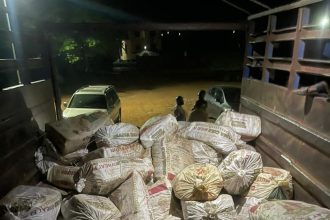The Senate on Wednesday passed the second reading of the Electricity Act (Amendment) Bill, 2025, aimed at addressing critical gaps in the 2023 Electricity Act and revitalizing Nigeria’s ailing power sector.
The bill’s lead sponsor, Senator Enyinnaya Abaribe (APGA-Abia), who also chairs the Senate Committee on Power, presented the lead debate during plenary.
Abaribe explained that the amendment seeks to resolve several pressing issues that have arisen since the original legislation was enacted.
According to him, the bill is designed to improve coordination between federal and state governments to prevent legal conflicts, enhance sector financing amidst a deepening debt crisis, and criminalize vandalism of electricity infrastructure due to the rising incidence of sabotage.
“Strengthen sectoral financing in the face of crippling sector debt crisis: Criminalise critical electricity infrastructure vandalism in the face of the rising wave of recurrent sabotage by vandals,” Abaribe stated.
“Foster industrial relations in the sector by balancing labour rights in the context of essential services as recognised by domestic and international best labour practices and instruments.
“Clarify ongoing transitional provisions for the transfer of intra-state electricity matters from the Nigerian Electricity Regulatory Commission (NERC) to state governments.
“Especially, matters having bearings on the operation of the national grid system and other overlapping issues.”
He expressed concern over the current state of the Nigerian Electricity Supply Industry, noting that the sector is teetering on the brink of collapse due to systemic inefficiencies and a ballooning debt burden running into trillions of naira.
“This Bill should, therefore, be seen as part of the broader efforts to salvage the power sector from imminent collapse,” he warned.
Senator Garba Maidoki (APC-Kebbi) added his voice to the debate, criticizing the affordability of electricity.
“I cannot imagine as a senator, I cannot pay my power bill for one month. Then what am I working here (National Assembly) for; what of the ordinary person. I think we need to take this totally so that this rate of electricity should be generated in such a way that Nigerians will be able to enjoy these natural resources,” he said.
Also contributing, Senator Abdulfatai Buhari (APC-Oyo) emphasized the need for strict penalties to deter vandalism.
“Mr President, if you look, critical electricity infrastructure is one of the biggest problems we have in this country today.
How can you install, and you paid for the job done, and then you now go back to carry it away and when you are now caught, they take you to court.
If there is no real punitive measure like the mover of the bill said, we’ll continue to go up and down.”
Senator Yunus Akintunde (APC-Oyo) highlighted structural issues within the electricity market.
“The electricity issue; Gencos and Discos are not contractors. They are privately owned companies that are in business on their own.
The main issue with electricity supply in Nigeria is when you license some people to generate electricity.
You license some people to distribute electricity and government is already on with the transmission.
I know, I believe that is one of the critical problems that electricity supply is having.
If you look at the infrastructure in transmission, they are old and they are not being useful again.
I have been an apostle of the gospel that government money should not be used to buy transformers,” he said.
In his closing remarks, Senate President Godswill Akpabio commended the Committee on Power for its efforts and expressed optimism that the bill would address public concerns during the public hearing stage.
“I hope that by the time it goes through public hearing…because the issues that bother the Nigerian public will be addressed.
Without electricity, there is no way we can have industrial growth in the country and so everybody is looking forward to the transformation of this sector,” he stated.











